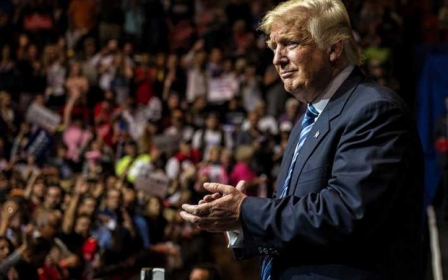Assad: Donald Trump is a 'natural ally' in fight against 'terrorism'
Syrian President Bashar al-Assad said in an interview aired on Tuesday that Donald Trump will be a "natural ally" if the US president-elect fulfils his pledge to fight "terrorists".
In his first reaction to Trump's election victory last week, the Syrian president struck a note of caution and said he was unsure the American billionaire would be able to keep his word and step up the fight against those deemed to be terrorists by the Syrian government.
"We cannot tell anything about what he's going to do, but if... he is going to fight the terrorists, of course we are going to be ally, natural ally in that regard with the Russian, with the Iranian, with many other countries," he told Portugal's RTP state television.
READ: Trump and the Middle East: What he could do with Iran, Israel, Syria
Assad's government routinely describes all elements of the opposition to the Syrian government as terrorists, while the US has backed and armed some groups fighting both pro-government forces and the Islamic State (IS) group.
Washington leads an international coalition that is conducting air strikes against IS militants in Syria and neighbouring Iraq.
Asked about Trump's campaign comments suggesting the United States should focus more on fighting IS, Assad said he would welcome such a move but was cautious.
"I would say this is promising, but can he deliver?" said Assad, who was speaking in English.
"Can he go in that regard? What about the countervailing forces within the administration, the mainstream media that were against him? How can he deal with it?" he said.
"That's why for us it's still dubious whether he can do or live up to his promises or not.
"That's why we are very cautious in judging him, especially as he wasn't in a political position before," said Assad.
Trump’s support for Assad
In an interview with The New York Times on 26 March, Trump said he thought "the approach of fighting Assad and ISIS (IS) simultaneously was madness, and idiocy".
"You can't be fighting two people that are fighting each other, and fighting them together. You have to pick one or the other," said Trump.
And during campaigning, Trump also pledged to improve America's ties with Assad's main backer, Russia.
After his election victory, Trump told The Wall Street Journal: "I've had an opposite view of many people regarding Syria."
He also said that if the United States attacks Assad "we end up fighting Russia".
US lawmakers vote for new Syria sanctions
But while Trump may have shown support for Assad, US lawmakers passed bills on Tuesday imposing new sanctions on Syria and renewing others on Iran for 10 more years, underscoring their determination to play a strong role in Middle East policy no matter who occupies the White House.
The House of Representatives passed a bill that would sanction the government of Syria, and supporters including Russia and Iran, for war crimes and crimes against humanity.
The House also voted 419 to one for a 10-year reauthorisation of the Iran Sanctions Act, or ISA, a law first adopted in 1996 to punish investments in Iran's energy industry and deter Iran's pursuit of nuclear weapons.
The Iran measure will expire at the end of 2016 if it is not renewed. It must still be passed by the Senate and signed by President Barack Obama in order to become law.
The Obama administration and other world powers reached an agreement last year in which Teheran agreed to curb its nuclear programme in exchange for sanctions relief.
But lawmakers said they wanted the ISA to stay in effect to send a strong message that the United States will respond to provocations by Iran and give any US president the ability to quickly reinstate sanctions if Teheran violated the nuclear agreement.
"Even after a hard-fought election here at home and power changing hands, American leadership on the global stage won't falter," said Representative Eliot Engel, the top Democrat on the House Foreign Affairs Committee, a Bill sponsor.
Republican Representative Ed Royce, chairman of the Foreign Affairs Committee, the bill's lead sponsor, called the ISA "a critical tool".
"Its expiration would compound the damage done by the president's dangerous nuclear deal and send a message that the United States will no longer oppose the destructive role of Iran in the Middle East," said Royce.
The vote took place one week after Republican Donald Trump was elected US president. Congressional Republicans unanimously opposed the nuclear deal, along with about two dozen Democrats, and Trump has also strongly criticised it.
Lawmakers from both parties said they hoped bipartisan support for a tough line against Iran would continue under the new president.
There was no immediate word from Senate leaders on when the ISA and the Syria measure might be taken up in that chamber.
New MEE newsletter: Jerusalem Dispatch
Sign up to get the latest insights and analysis on Israel-Palestine, alongside Turkey Unpacked and other MEE newsletters
Middle East Eye delivers independent and unrivalled coverage and analysis of the Middle East, North Africa and beyond. To learn more about republishing this content and the associated fees, please fill out this form. More about MEE can be found here.




